Collection: Epoxy Resin and Hardener
Shop Our High-Quality Epoxy Resin and Hardener Kits: Perfect for Every Application.
SC110 epoxy resin is a non-toxic, marine grade, 100% solids epoxy with UV protection additives that offer long term non-yellowing protection.
-
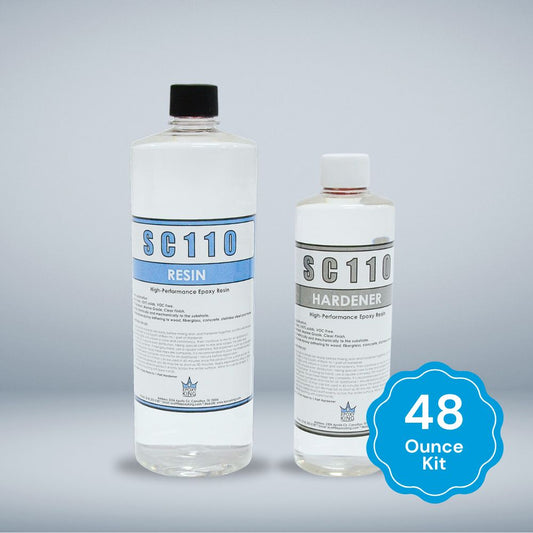
SC110 48 oz Epoxy Resin Kit
View detailsRegular price $49Regular priceUnit price / per -
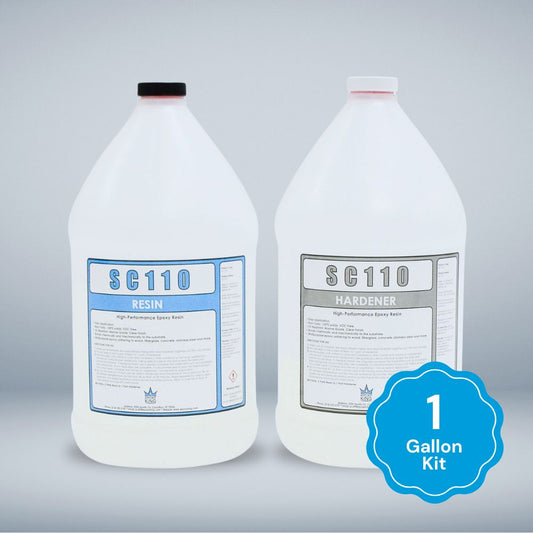
SC110 1 Gallon Epoxy Resin Kit
View detailsRegular price $72Regular priceUnit price / per -
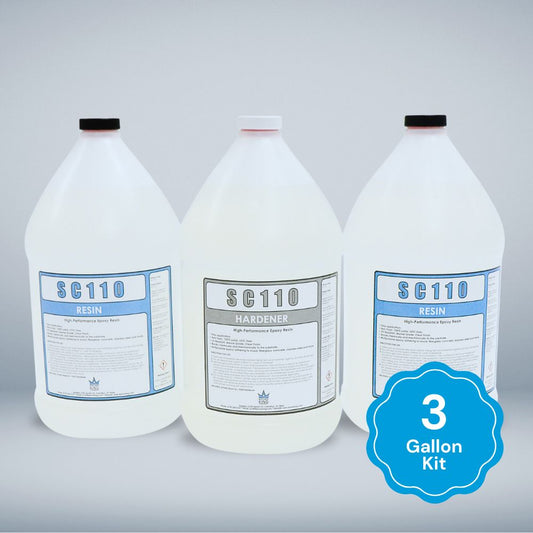
SC110 3 Gallon Epoxy Resin Kit
View detailsRegular price $210Regular priceUnit price / per -
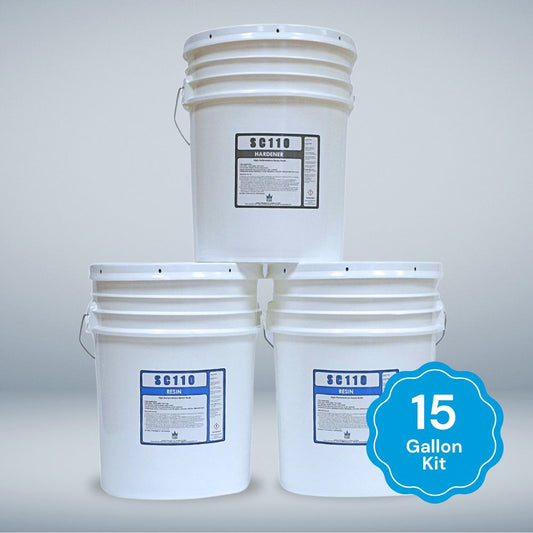
SC110 15 Gallon Epoxy Resin Kit
View detailsRegular price $840Regular priceUnit price / per -
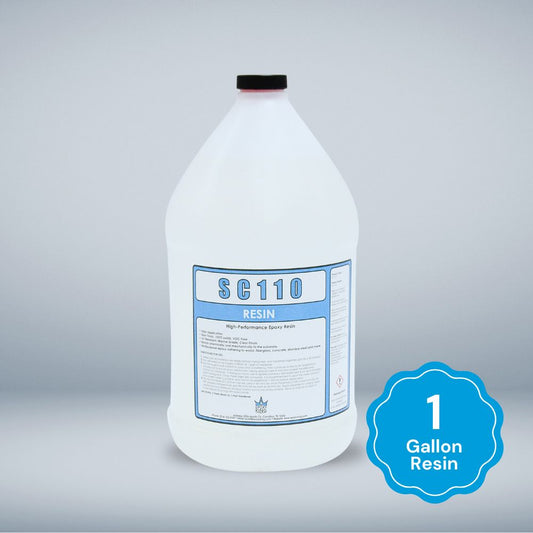
SC110 1 Gallon Epoxy Resin Only
View detailsRegular price $72Regular priceUnit price / per -
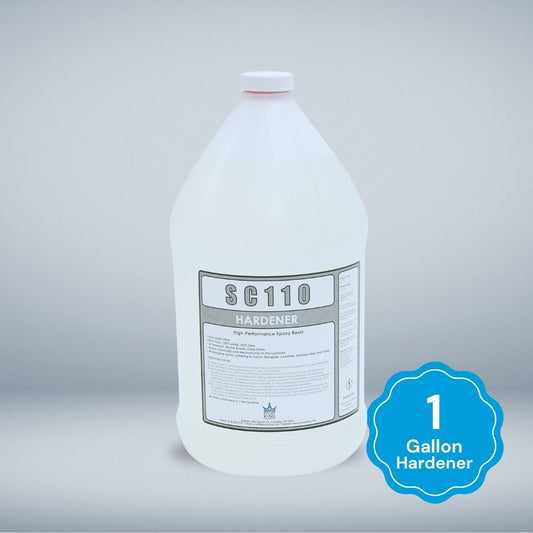
SC110 1 Gallon Hardener Only
View detailsRegular price $80Regular priceUnit price / per
Epoxy resin and hardener are a powerful duo that can help you achieve the highest quality results for various applications. Whether you’re working on a DIY project, professional crafting, or industrial applications, understanding how these materials work together is key to achieving success. At Epoxy King, we offer premium epoxy resin and hardener kits that ensure a seamless blending experience, resulting in high-strength, durable finishes.
Frequent Questions
Here’s a comprehensive FAQ that covers various aspects
What is Epoxy Resin and Hardener?
Epoxy resin is a type of thermosetting polymer known for its excellent adhesion, resistance, and durability. It is used widely in the construction, art, automotive, and electronics industries. The resin itself is typically a liquid that, when mixed with a hardener, undergoes a chemical reaction, transitioning from a liquid state to a solid form. This curing process results in a material that’s both tough and long-lasting.
The hardener is the counterpart to the resin. It’s a compound that, when combined with the resin, activates the chemical crosslinking reaction that transforms the mixture into a solid, robust material. It is critical to use the correct ratio of resin to hardener for optimal results.
Why is the Correct Mix Ratio Important?
Mixing the epoxy resin and hardener in the correct ratio is essential for achieving a high-quality finish. Typically, the ratio is specified by weight or by volume and can vary depending on the product you are using. A typical ratio may be 1:1 or 2:1 resin to hardener. Following the recommended guidelines ensures that the chemical reaction proceeds correctly, resulting in an evenly cured material with the desired properties.
If the mix ratio is incorrect, several issues can arise, including incomplete curing, low strength, or a cloudy finish. It’s important to carefully follow the manufacturer’s guidelines and measure the components precisely.
How to Mix Epoxy Resin and Hardener?
Mixing the components correctly is crucial for the success of your project. Here’s a simple guide on how to mix your epoxy resin and hardener:
- Prepare the Workspace: Ensure you’re in a well-ventilated area, as some epoxies may have a strong odor during the curing process. Lay down protective coverings, such as plastic sheeting or newspaper, to protect your workspace from spills.
- Measure the Components: Using a scale, weigh the resin and hardener separately. Make sure to follow the ratio specified on the product. If you don’t have a scale, a measuring cup marked with the appropriate units can be used.
- Mix Thoroughly: Pour the measured resin and hardener into a clean mixing container. Using a stir stick, mix the two components thoroughly for 2-3 minutes. Make sure to scrape the sides and bottom of the container to ensure all the material is mixed evenly. Mixing thoroughly is important because incomplete mixing can lead to parts of the mixture remaining uncured.
- Apply the Mixture: Once the epoxy has been mixed, it’s time to use it. The mixture will have a limited pot life (working time), so be sure to apply it before it begins to harden. For coatings, laminates, or casting applications, pour the mixture onto the surface and spread evenly.
- Curing Process: After application, allow the epoxy to cure according to the instructions provided by the manufacturer. The curing time can vary based on factors such as temperature and humidity. During this time, the epoxy will undergo crosslinking, which gives it its strength and durability.
What are the Best Practices for Applying Epoxy Resin and Hardener?
Applying epoxy resin and hardener correctly ensures a smooth, even finish. Below are some best practices that can help:
- Use the Right Tools: Invest in high-quality tools designed for epoxy applications, such as brushes, spatulas, and mixing containers. These tools help you achieve a consistent and professional-looking finish.
- Work in a Controlled Environment: Epoxy resin is sensitive to temperature and humidity. The ideal working temperature is typically between 70°F and 80°F. Extreme temperatures can impact the curing process and final results.
- Prevent Bubbles: When mixing epoxy, air bubbles can form in the resin. To minimize bubbles, mix slowly and steadily. If bubbles do form during application, use a heat gun or blowtorch to gently pass over the surface, which will cause the bubbles to rise to the top and burst.
- Work in Layers: For larger projects, applying epoxy resin in layers can help achieve a smooth, even finish. Allow each layer to cure before applying the next to avoid mixing or contamination.
- Protect the Finish: After the epoxy has fully cured, be sure to protect it from UV exposure and harsh chemicals, especially for outdoor applications. Some epoxies may yellow over time when exposed to the sun, so using a UV-resistant topcoat can help preserve the clarity of your work.
What are the Application types of Epoxy Resin and Hardener?
Epoxy resin and hardener can be used for a wide range of applications across various industries. Some of the most common uses include:
- Coatings and Finishes: Epoxy is used to create strong, durable coatings for wood, concrete, metal, and other surfaces. It’s often used in the construction industry to seal floors, counter tops, and other high-traffic areas.
- Art and Craft Projects: Popular choice for artists and crafters creating jewelry, sculptures, and other artistic works. Its ability to create a clear, glossy finish makes it ideal for preserving colors and adding depth to artwork.
- Casting: Used for casting molds for various items, such as figurines, custom jewelry, and furniture parts. Its high strength and clear finish make it perfect for creating detailed, long-lasting casts.
- Repairs and Adhesives: Epoxy adhesives are used for repairing broken items, including glass, ceramics, and plastics. Their strong bonding properties ensure that the repairs are long-lasting and durable.
- Marine Applications: It is widely used in boat building and repairs. It provides a waterproof, strong, and resistant finish that’s essential for the harsh conditions of the water.
Why Choose Epoxy King for Your Epoxy Resin and Hardener Needs?
When it comes to finding the best epoxy resin and hardener, Epoxy King stands out as a top choice. We provide high-quality, reliable products designed to meet the needs of both DIY enthusiasts and professionals. Our products offer superior strength, clarity, and durability, making them ideal for a wide range of applications.
Whether you’re a hobbyist working on a small project or a professional handling larger tasks, Epoxy King’s resin and hardener kits provide everything you need to get the job done right. Plus, with easy-to-follow instructions and customer support, you can feel confident in your purchase.
Useful Resources
View All-

How To Use Resin Epoxy: Step-By-Step Instructions
Epoxy resin opens up endless creative possibilities, from glossy table tops to delicate jewelry pieces. But...
How To Use Resin Epoxy: Step-By-Step Instructions
Epoxy resin opens up endless creative possibilities, from glossy table tops to delicate jewelry pieces. But...
Read More -

How To Choose Epoxy Resin That Matches Your Needs
Walking into a store or browsing online for epoxy can feel overwhelming. Dozens of products promise...
How To Choose Epoxy Resin That Matches Your Needs
Walking into a store or browsing online for epoxy can feel overwhelming. Dozens of products promise...
Read More -

Is Epoxy Resin Dishwasher Safe? What You Need To Know
Is epoxy resin dishwasher safe? Unfortunately not. Even food-safe epoxy resin should never go through a...
Is Epoxy Resin Dishwasher Safe? What You Need To Know
Is epoxy resin dishwasher safe? Unfortunately not. Even food-safe epoxy resin should never go through a...
Read More









